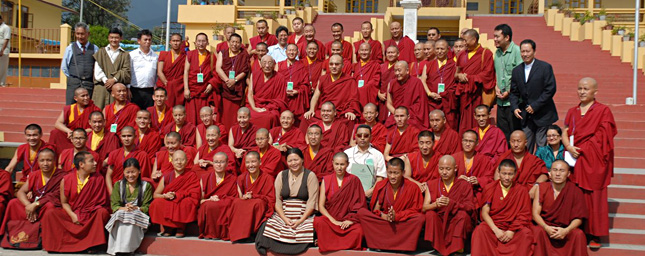法王新闻 | 2009年10月
召開第二屆噶舉傳承環保會議【總結開示】
Gyalwang Karmapa’s Closing Remarks Conference on Environmental Protection
地點:印度 上密院
時間:2009年10月08日
報導:Tashi Paljor
攝影:Tashi Paljor

and the speakers of the conference
法王的會議總結開示
法王對於每一位與會者表示感謝,特別是要感謝Dekil Chungyalpa,沒有她,這個會議是不可能舉辦的。
His Holiness thanked everybody who had been involved in the conference, particularly Dekil Chungyalpa, without whom the conference would not have been possible, and congratulated the monasteries for participating in this second conference.
法王同時也恭賀能夠參與此第二屆噶瑪噶舉環保會議的寺院。法王非常珍惜大家的努力,但是,重要的是大家所抱持的動機。大家實踐環保,並不是為了討好法王,也不是為了與其他的寺院相互競賽,而應該是全心全意地為了利益所有的眾生而做的。大家必須要有這樣的祈願。
He said how much he appreciated their efforts but the motivation was important. Working for environmental protection should not be just to please him nor out of competitiveness with other monasteries, but should be done wholeheartedly with the motivation that environmental protection is benefiting all sentient beings. They should hold this aspiration.
法王提醒每一個人,不具道德行為的修行即是枉然。
His Holiness reminded everybody that religious practice without ethical behaviour was empty.
在這個星球上,有著上百萬的昆蟲、動物、與植物。人類無法單靠自身而存活,而是需要倚靠所有的生物。由於所有生活在這個星球的生物都息息相關,因此即使為了人類自身的生存與福祉,我們也都必須關心並保護整個生態環境。
On this planet, there are millions of insects, animals and plants. In order to survive, human beings need all of them. It is not possible for humans to survive on their own. Because all living things on this planet are interdependent, we all have to take an interest in and act to protect the environment for our own survival and happiness.
同樣地,佛陀也經常教導我們不可傷害眾生,而是要利益眾生。但是,我們經常是只專注於自身的舒適,並不瞭解日用之物是否對環境有害。事實上,無論是直接地或是間接地,我們的生活型態都會對環境形成破壞。所以,我們絕不能自認滿意地說:「我沒有傷害任何眾生。」,而是必須以一個新的角度來看待事情。
Likewise, Buddha’s teachings frequently instruct us to work for the benefit of others and to stop harming them, but often we do not know whether the everyday things we use are harmful to the environment or not; usually, we are focused on our own comfort. However, our lifestyle harm the environment, directly or indirectly, so we can’t be complacent and think, ” I am not harming anybody.” We have to view things from a new perspective.
法王記得自己還住在西藏的時候,人們一天只需要工作幾個小時就足夠過日子﹔因此,剩下的時間就可以和家人相處,或是從事休閒活動。但是,現在居住在城市的人們,一天工作24個小時還嫌不夠。照這樣下去,很快地人們一天可能得工作48個小時,而再也沒有睡眠的時間。法王反問大家:「為什麼一天工作24個小時賺的錢還不夠生活?」法王接著說:「因為人類的貪婪沒有止境,除非我們自身有能力去抑止它。」
When His Holiness lived in Tibet, people used to work only a few hours a day, and yet that was sufficient to earn a living, so that the rest of the time could be spent with the family or at leisure. Nowadays, in the city people work for 24 hours, and even that is not enough. At this rate the day may come when they have to work for 48 hours and there won’t be time to sleep any more. “Why is it”, asked the Karmapa, “that people can’t earn enough money to live on even working 24 hours? Because there is no end to human greed, unless we ourselves are able to check it.”
法王指出,與過去的人相較之下,現代人消耗的能源實在是太多了,所以,現代人所遭遇到的困難其實也是自己造成的。不但如此,現代人試著學機器一樣全年全日無休,但是,人畢竟是人,不是機器,人是會累的。歸結到最後,這些所有的痛苦還是根源於人類的貪婪。人們自認必須擁有事實上不需要的東西,結果則是自己讓自己痛苦。每一個人都應該要對此好好地思考。
Gyalwang Karmapa pointed out that compared with earlier times, people these days consume so much energy. All the difficulties that they now face are created by themselves. They try to behave like machines, but humans are not machines – machines never get tired. And in the end, all the suffering comes back down to human greed. People think they need things that they actually don’t, and consequently, they cause themselves to suffer. Everyone needed to reflect on this.
環境保護的要點是:每一個人應當在日常生活中實踐環保,並且應當為所有眾生的利益著想,而非為一己的利益著想﹔這也是大乘佛法傳統中的一項要件。
It was important for everyone to put environmental protection practice into daily life, and, instead of thinking of their own benefit, to think for the benefit of all sentient beings, which is an essential feature of the Mahayana Buddhist tradition.
接著法王與眾人分享了自己的祈願 ——— 如果能夠,我願變成地球的守護者,像帳篷般地覆蓋保護著地球﹗
Then Gyalwang Karmapa shared his own aspiration ─ that if he had the power he would become the protector of the earth and cover it like a tent.
對世界的祈願
Aspiration for the World
會議的壓軸是由法王辦公室僧俗二眾,唱誦法王所著的「世界啊﹗」祈願詩文。第一遍是以藏文唱誦,第二遍則是以英文。
The final event of the conference was a performance by monks and laypeople from Tsurphu Labrang of Gyalwang Karmapa’s poem Aspiration for the World, first in Tibetan and then in English.
《世界啊》
世界啊!我們在您懷裡生生死死,World, we live and die on your lap,
我們的苦樂在您身上自然舞動。On you we experience all our woes and joys.
您是我們的家,從古至今。You are our ancestral home of old.
我們永遠珍惜您。Forever we cherish and adore you.
願您,化為那夢中的淨土,We wish to transform you into the pure realm of our dreams.
一切平等無私的國度,We wish to transform you into a land for all creatures, Equal for all and free of prejudice.
與慈愛溫柔的天女;We wish to transform you into a loving, warm and gentle goddess.
擁抱著您的冀盼,堅定不移。Our hope in you is so ever resolute.
您是最親的滋養;So please be the ground on which we all may live So all these wishes may come true, So all these wishes may come true.
切莫任意展露您黑暗的一面。Do not show us the dark side of your character, Where nature’s calamities reign.
我們要讓您的一方一土,成為和平良田,In every section of our world’s land May there thrive a fertile field of peace and joy,
千萬幸福的果實,自由芬芳,Rich with the leaves and fruits of happiness,Filled with the many sweet scents of freedom.
圓滿成熟我們無盡的期望。May we fulfil our countless and boundless wishes.
第十七世大寶法王鄔金欽列多傑著,英文翻譯Tyler Dewar.
Composed by the 17th Karmapa, Ogyen Trinley Dorje, and translated into English by Tyler Dewar.
